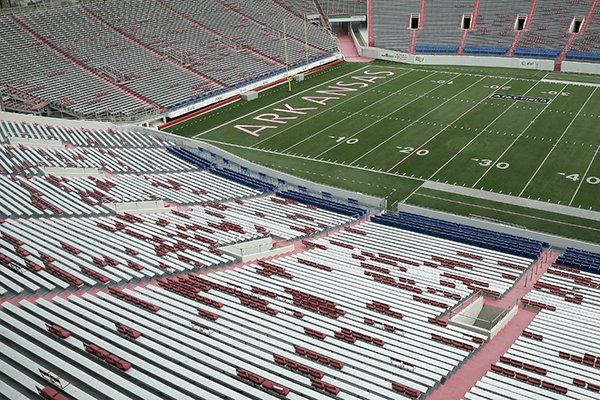Arkansans on social media taught me something the afternoon of Sept. 12. I never knew that a stadium could cause a college football team to lose. But if you read what was being written by many Razorback fans in the wake of the University of Arkansas' stunning loss to Toledo, it was War Memorial Stadium's fault rather than the fault of the players and coaches.
On the morning of that game, this newspaper had a large headline on the front of the sports section that read "Countdown to zero," along with an altered illustration of a half-empty War Memorial Stadium. No more Hog games in the capital city. That seems to be the conventional wisdom, driven in part by the fact that the Razorbacks are 1-5 in Little Rock since 2012.
Before you jump on the social-media bandwagon and join those who say Little Rock games are history once the current contract expires in 2018, you might want to consider the things outside of football that are now at play. I was a senior staffer in the governor's office 15 years ago during what commonly was called the Great Stadium Debate. Just as was the case then, the decision in 2018 will not be made in a vacuum by the athletic director. It will be made by members of the University of Arkansas Board of Trustees since Razorback football games are such a part of the cultural fabric of the state. This issue is bigger than football.
Earlier this month, we learned that even though the University of Arkansas has the largest freshman class in its history, the overall number of students from Arkansas is down. This newspaper reported in a Sept. 11 news story: "Growth largely has been based on an influx of out-of-state students. This year's freshman class of 4,916 students continues the trend with 51 percent arriving from outside Arkansas."
At a time when the University of Arkansas has record enrollment, the number of Arkansans attending the flagship university is falling. That's disturbing on many levels. In the 2010 census, Arkansas ranked next-to-last nationally (ahead of only West Virginia) in the percentage of adults with a bachelor's degree or higher. That ranking is going to have to change if Arkansas is to ever move ahead economically in the knowledge-based economy of the 21st century. Realizing the gravity of the situation, former Gov. Mike Beebe said the state should set a goal of doubling the number of college graduates in Arkansas by 2025. If the trend of declining numbers of Arkansans attending the university persists, trustees will take a strong look at whether the UA still appeals to young people in places such as the Arkansas Delta and south Arkansas.
What does this have to do with War Memorial Stadium? Here's what: Playing Razorback football games in Little Rock traditionally has been part of the university's strategy to connect with families who live far from the Fayetteville campus. No one argues that the athletic department makes more money by playing games in Fayetteville. Athletic directors must be concerned about things like that. Members of the board, however, are appointed by the governor to look at the big picture. And the big picture is starting to play in favor of keeping at least one football game a year in the state capital as an outreach to families in other parts of Arkansas.
Those who claim that "no one does this anymore" aren't following college football. Oklahoma and Texas still play every year at the old Cotton Bowl in Dallas because it's a tradition. Georgia and Florida still play each year in Jacksonville, Fla., because it's a tradition. Texas A&M will play games in both Houston and Arlington, Texas, this season. Auburn opened its season in Atlanta. Alabama opened its season in Arlington, Texas. North Carolina and South Carolina began their seasons in Charlotte, N.C. Playing games away from campus is now more of a trend rather than less of one.
The huge amount of money that Southeastern Conference schools receive for television rights--the cable-based SEC Network has been highly successful--makes per-game revenue a smaller part of the overall athletic budget than before. In other words, Arkansas can easily afford to make a little less money in Little Rock than it would make in Fayetteville if playing in Little Rock better advances the overall goals of the university. And one of the primary goals is getting more Arkansans into college.
Attracting the interest of young Texans in attending the University of Arkansas has been one of the reasons given for playing Texas A&M each year at AT&T Stadium in Arlington. There's no reason the Razorbacks can't continue to play there while also playing at least one game each fall in Little Rock. But if the choice does have to be made between the two, UA trustees need to ask themselves this question: "Is it more important to the overall goals of the university to have a game each year in an adjoining state or in the largest city of the state where the university is located?"
There are powerful political forces at play. Some legislators are talking about ways to force an annual game between the University of Arkansas and Arkansas State University. For now, I don't see that happening. But I do think the UA trustees will take into consideration more than just football when it comes time to renegotiate the contract with the War Memorial Stadium Commission. When the number of Arkansans attending the UA is falling, there's far more than the wants and needs of the athletic department to be considered.
------------v------------
Freelance columnist Rex Nelson is the director of corporate communications for Simmons First National Corp. He's also the author of the Southern Fried blog at rexnelsonsouthernfried.com.
Editorial on 09/23/2015

